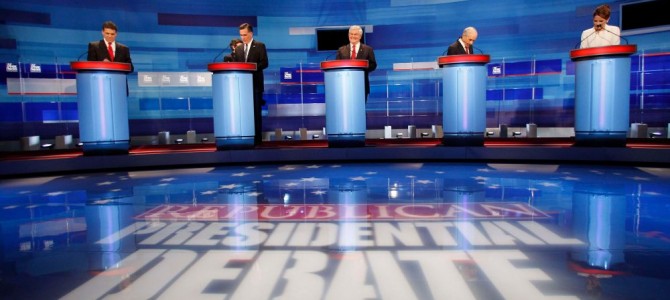The official Republican debate calendar is here, and I don’t mean to scare you, but you have less than three months before this whole thing goes to eleven. Or I should say at least eleven, because the Republican National Committee seems to be moving toward capping the early debates at 12 candidates. Even that is much higher than the number included in the scrums of 2012, and it has party leaders concerned that it might make for a big mess on TV. And they’re probably right – except for the bit about changing the channel. Who doesn’t love to watch a good trainwreck? And that’s what these debates will be if they’ve got 12 candidates shoved onstage in a typical format.
The problem with the debate format really is that it isn’t a debate. The back and forth is relatively rare at the presidential level. Instead, you have moderators tee up questions to specific candidates, where others jump in – either looking like interrupting cows MOO or talking heads too egotistical to let an issue go by without weighing in with their carefully crafted three bullet response. The actual degree of debate between the candidates on a particular issue is relatively rare, but it tends to lead to the most memorable moments of substance in debates. The most memorable non-substance moments tend to involve showdowns between the candidates and someone who is not running for president – the moderator.
So I have a simple, counterintuitive suggestion to consider as an alternative to this current strife, one which I think might lead in this current field to a more intelligent, meaningful debate, but where the disagreements on policy are actually allowed more airtime than they do under the current format: shoot the moderator.
Well, not literally. But seriously, try a debate where you get rid of them entirely. In recent years, the moderator has been a repeated force for skullduggery in the Republican Party. The resentment some Republicans have for George Stephanopoulos, Candy Crowley, John King and others is entirely outsized given their relatively centrist positioning on the policy issues compared to other anchors. It is entirely driven by the view that they have repeatedly put their thumbs on the scale in favor of injecting left-wing narratives, jumping into highly personal territory, or playing real-time fact-checker for the candidates. This has a general tendency to turn debates into contests between the moderators and the candidates about who will screw up more. Rather than just introducing a topic and stepping offstage, moderators have weighed into the proceedings in ways that have a profound impact on the nominating process. No media personality should have such power.
Here’s how a debate would work if you cut that out: candidates would debate an actual topic for an extended amount of time – say three topics with three questions in a policy space over an entire 90 minute debate (for example, a foreign policy debate where the questions concern what to do about ISIS, what to do about Russia, and what to do about the NSA, or an economic debate about taxes, trade, and Too Big To Fail). With 12 candidates speaking in that time period, they’re still only going to get two and a half minutes on each topic – but without a moderator, candidates are more likely to be drawn into debates with the people on the stage who disagree with their views. In a more free-flowing debate, there is no Wolf Blitzer to cut things off, and the confrontations will be more extended – but I expect also more substantive, as arguments will be more extended, gotcha questions eliminated, and the need to have quick quips as a substitute for a point will not be as pressing.
I could be wrong. Maybe Ted Cruz would talk uninterrupted for the first 45 minutes. Maybe before you’d know it there would be a guy with a trident and a man on fire. But I suspect the irony of the current messy debate format is that eliminating the person who is supposed to establish order could lead to a more orderly conversation, in a spontaneous way. Lincoln and Douglas didn’t need a moderator and neither does this crew.
Plus, at the foreign policy one, we’d finally get to see Rand Paul look around the stage and say, “None of you understand. I’m not locked up in here with you. You’re locked up in here with me.”









